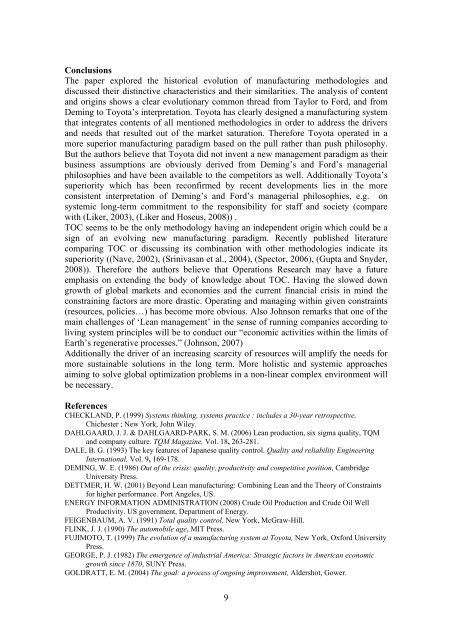TQM, TPM, TOC, Lean and Six Sigma – Evolution of manufacturing ...
TQM, TPM, TOC, Lean and Six Sigma – Evolution of manufacturing ...
TQM, TPM, TOC, Lean and Six Sigma – Evolution of manufacturing ...
You also want an ePaper? Increase the reach of your titles
YUMPU automatically turns print PDFs into web optimized ePapers that Google loves.
Conclusions<br />
The paper explored the historical evolution <strong>of</strong> <strong>manufacturing</strong> methodologies <strong>and</strong><br />
discussed their distinctive characteristics <strong>and</strong> their similarities. The analysis <strong>of</strong> content<br />
<strong>and</strong> origins shows a clear evolutionary common thread from Taylor to Ford, <strong>and</strong> from<br />
Deming to Toyota’s interpretation. Toyota has clearly designed a <strong>manufacturing</strong> system<br />
that integrates contents <strong>of</strong> all mentioned methodologies in order to address the drivers<br />
<strong>and</strong> needs that resulted out <strong>of</strong> the market saturation. Therefore Toyota operated in a<br />
more superior <strong>manufacturing</strong> paradigm based on the pull rather than push philosophy.<br />
But the authors believe that Toyota did not invent a new management paradigm as their<br />
business assumptions are obviously derived from Deming’s <strong>and</strong> Ford’s managerial<br />
philosophies <strong>and</strong> have been available to the competitors as well. Additionally Toyota’s<br />
superiority which has been reconfirmed by recent developments lies in the more<br />
consistent interpretation <strong>of</strong> Deming’s <strong>and</strong> Ford’s managerial philosophies, e.g. on<br />
systemic long-term commitment to the responsibility for staff <strong>and</strong> society (compare<br />
with (Liker, 2003), (Liker <strong>and</strong> Hoseus, 2008)) .<br />
<strong>TOC</strong> seems to be the only methodology having an independent origin which could be a<br />
sign <strong>of</strong> an evolving new <strong>manufacturing</strong> paradigm. Recently published literature<br />
comparing <strong>TOC</strong> or discussing its combination with other methodologies indicate its<br />
superiority ((Nave, 2002), (Srinivasan et al., 2004), (Spector, 2006), (Gupta <strong>and</strong> Snyder,<br />
2008)). Therefore the authors believe that Operations Research may have a future<br />
emphasis on extending the body <strong>of</strong> knowledge about <strong>TOC</strong>. Having the slowed down<br />
growth <strong>of</strong> global markets <strong>and</strong> economies <strong>and</strong> the current financial crisis in mind the<br />
constraining factors are more drastic. Operating <strong>and</strong> managing within given constraints<br />
(resources, policies…) has become more obvious. Also Johnson remarks that one <strong>of</strong> the<br />
main challenges <strong>of</strong> ‘<strong>Lean</strong> management’ in the sense <strong>of</strong> running companies according to<br />
living system principles will be to conduct our “economic activities within the limits <strong>of</strong><br />
Earth’s regenerative processes.” (Johnson, 2007)<br />
Additionally the driver <strong>of</strong> an increasing scarcity <strong>of</strong> resources will amplify the needs for<br />
more sustainable solutions in the long term. More holistic <strong>and</strong> systemic approaches<br />
aiming to solve global optimization problems in a non-linear complex environment will<br />
be necessary.<br />
References<br />
CHECKLAND, P. (1999) Systems thinking, systems practice : includes a 30-year retrospective,<br />
Chichester ; New York, John Wiley.<br />
DAHLGAARD, J. J. & DAHLGAARD-PARK, S. M. (2006) <strong>Lean</strong> production, six sigma quality, <strong>TQM</strong><br />
<strong>and</strong> company culture. <strong>TQM</strong> Magazine, Vol. 18, 263-281.<br />
DALE, B. G. (1993) The key features <strong>of</strong> Japanese quality control. Quality <strong>and</strong> reliability Engineering<br />
International, Vol. 9, 169-178.<br />
DEMING, W. E. (1986) Out <strong>of</strong> the crisis: quality, productivity <strong>and</strong> competitive position, Cambridge<br />
University Press.<br />
DETTMER, H. W. (2001) Beyond <strong>Lean</strong> <strong>manufacturing</strong>: Combining <strong>Lean</strong> <strong>and</strong> the Theory <strong>of</strong> Constraints<br />
for higher performance. Port Angeles, US.<br />
ENERGY INFORMATION ADMINISTRATION (2008) Crude Oil Production <strong>and</strong> Crude Oil Well<br />
Productivity. US government, Department <strong>of</strong> Energy.<br />
FEIGENBAUM, A. V. (1991) Total quality control, New York, McGraw-Hill.<br />
FLINK, J. J. (1990) The automobile age, MIT Press.<br />
FUJIMOTO, T. (1999) The evolution <strong>of</strong> a <strong>manufacturing</strong> system at Toyota, New York, Oxford University<br />
Press.<br />
GEORGE, P. J. (1982) The emergence <strong>of</strong> industrial America: Strategic factors in American economic<br />
growth since 1870, SUNY Press.<br />
GOLDRATT, E. M. (2004) The goal: a process <strong>of</strong> ongoing improvement, Aldershot, Gower.<br />
9

















